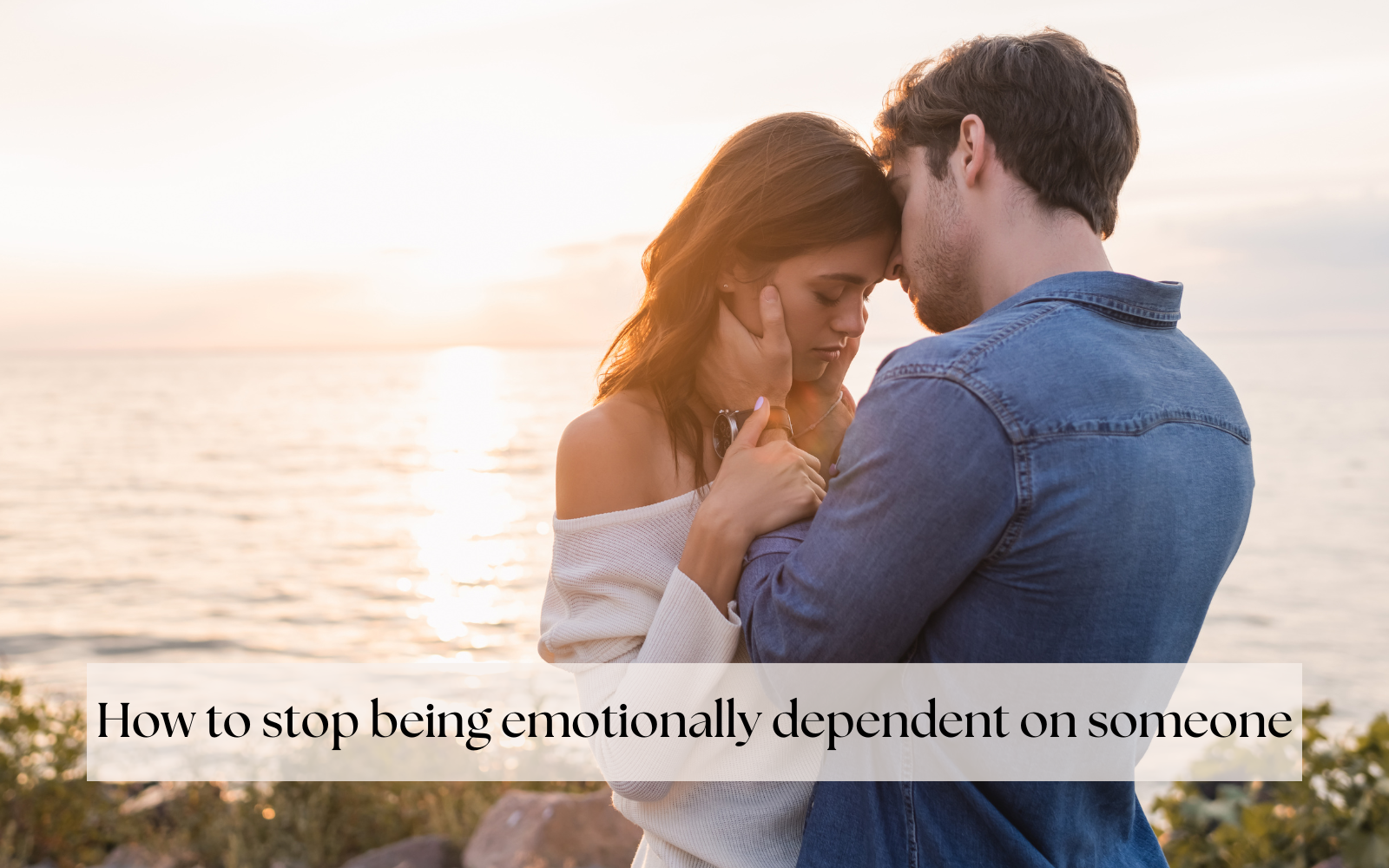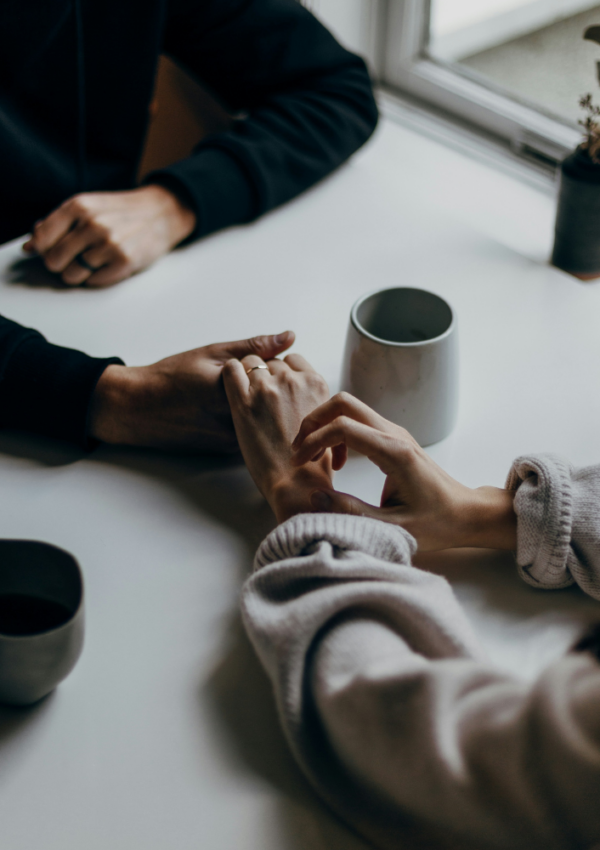If you feel anxious and overwhelmed whenever you don’t get reassurance from your partner, or are you trapped in a toxic relationship you are too scared to leave? This post teaches you with practical exercises how to stop being emotionally dependent on someone and empowers you to build the fulfilling, healthy relationship you deserve.
This post is all about how to stop being emotionally dependent on someone.
Your day ruined because he hasn’t texted you and you feel anxious doing anything without him? Or are you stuck in a relationship you know isn’t good for you, but you feel that you can’t live without your partner? Excusing toxic behavior, ignoring red flags, and isolating from others are some of the many symptoms of emotional dependency
Emotional dependence in relationships is really hard to overcome, because of the deeply rooted fear of abandonment and sense of low-self worth. This post is here to help you with practical tips and exercises how to stop being emotionally dependent on someone. I hope it helps!
How to stop being emotionally dependent on someone
1. Discover your Emotional Triggers
Why: The first step on your journey on how to stop being emotionally dependent on someone is to build self-awareness. You have to uncover the emotions driving dependency by reflecting on your daily experiences and reactions. When you are aware of your emotional triggers and the deeply rooted causes such as fear of abandonment, insecurities, or a lack of self-esteem, you can start your healing journey toward a fulfilling love life.
Exercise: Journaling for 10-15 minutes a day is an amazing way to gain self-awareness and understand your emotions. Get a cute journal to make the whole practice more fun. Here are some helpful prompts to help you reflect on your relationship patterns and emotional reactions:
- What emotions do I notice most often when I’m not with my partner?
- When was the last time I felt truly happy or fulfilled on my own?
- In what ways do I seek validation from my partner, and how does it impact my self-worth?
- How do I typically react when my partner doesn’t give me the attention or reassurance I crave?
- What fears or insecurities come up when I’m alone or not in contact with my partner?
- What are some activities or hobbies that make me feel fulfilled and content on my own?
- When was the last time I made a decision independently, and how did it make me feel?
- What are some past experiences that may have contributed to my emotional dependency?
- How do I feel about spending time alone, and what can I do to become more comfortable with it?
- What would my ideal emotionally balanced relationship look like?
Check out my post on life-changing journaling prompts for self-reflection, and start rediscovering yourself in aspects of life, such as dating, relationships, self-care, and healing.
2. Rediscover who you are
Why: Emotional dependence in relationships often stems from a loss of sense of who we are. Therefore, strengthening your self-identity, helps you reconnect with your true self, and rediscover your passions, needs, and goals.
Exercise: Creating a Self-Identity List, is a great way to reaffirm your sense of self and help you on your self-discovery journey. Make a list including:
- personal values,
- passions, and hobbies
- boundaries
- personal goals and visions
- friendships
- individual strengths and talents
3. Empower yourself with Boundaries
Why: Symptoms of emotional dependency are a lack of boundaries and self-respect. Learning to set personal boundaries is an important step in learning how to stop being emotionally dependent on someone. By protecting your emotional space it prevents you from being overly dependent on someone in a relationship.
Exercise: Practice saying no, when your boundaries are crossed or when you simply don’t feel like doing something. A confident “no” without over-explaining the reasons for it, might feel highly uncomfortable to you at the beginning. However, you need to learn, that by saying no, you won’t lose a healthy partner, but gain his respect and respect for yourself.
4. Take charge of your Emotions
Why: Learning how to manage symptoms of emotional dependency like anxiety, loneliness, and fear, will help you become less dependent on your partner to be able to deal with your emotions. Remember that no one is responsible for your emotions but you. Knowing that you don’t need another person to feel ok, is a valuable step in how to stop being emotionally dependent on someone.
Exercises:
- Mindful breathing: Focus on your breath, counting each inhale and exhale, and focus on positive thoughts.
- Visualization: Take 5 mins. to visualize you being calm, confident, and secure while being away from your partner.
- Grounding technique: If you feel extremely anxious, use the grounding countdown 5-4-2-1: Identify 5 things you can see, 4 things you can feel, 3 things you can hear, 2 things you can smell, and 1 thing you can taste. This helps anchor you in the present moment.
- Gratitude: When you are experiencing negative emotions, focus on the many things in life you are grateful for. Practicing Gratitude has many benefits for your mental and physical well-being.
5. Invest in your Support System
Why: The risk of emotional dependence in relationships often increases when we completely focus on our partner and neglect other important people in our lives. Appreciating and nourishing our friendships and family is crucial in realizing that we have a support system beyond our partner. This not only alleviates pressure but also enriches our lives with people who care about us.
Exercise: If you want to slowly learn how to stop being emotionally dependent on someone, it’s crucial to invest in other relationships regularly. Plan a date with your friends or family at least once a week, and make sure to stay in touch with them via phone or text message a few times a week. Set up a call, casual chat, go out for lunch, or do activities you enjoy together. When spending time without your partner, try to really focus on your loved ones and get comfortable getting a small break from your relationship.
6. Focus on Self-Care
Why: Focusing on self-care reminds you that your well-being is your responsibility, not your partner’s. It’s essential when you want to escape emotional dependence in relationships that you realize that taking care of yourself should be your number one priority.
Exercises: Create a weekly self-care routine, with different practices that make you happy such as meeting loved ones, exercising, meditation, hobbies, etc. A self-care routine is very personal because you know best what feels good to you. The following list can serve as inspiration:
- Morning Meditation (5-10 minutes daily)
- Exercise (30 minutes 3-4 times a week)
- Weekly Hobby Time (1-2 hours once a week)
- Reading (20-30 minutes daily)
- Digital Detox (1 hour daily or a full day weekly)
- Journaling (10 minutes daily)
- Nature Walks (1-2 times a week)
- Pampering Session (once a week)
- Deep Breathing or Stretching (5 minutes daily)
- Gratitude Practice (5 minutes daily)
7. Boost your Confidence
Why: A lack of confidence and self-worth are the roots of emotional dependency. You may be stuck in a toxic relationship because you feel that you don’t deserve better or you don’t have the confidence to stand up for yourself. This is why boosting your confidence should be one of your priorities in learning how to stop being emotionally dependent.
Exercises:
- Daily Affirmations: Stand in front of a mirror and practice positive affirmations such as: “I am beautiful”, “I deserve to be loved”, “I am worthy”, “I trust myself to make good decisions”, “I am happy and healthy no matter who I am with”.
- Challenge negative thoughts: If you catch yourself having a negative thought, write it down, and change it into a positive one.
- Small achievable goals: Set yourself weekly small achievable goals, and write down how you feel once they are completed.
- Step out of your comfort zone: Once a week try to do something that feels a little bit uncomfortable, such as speaking up in a meeting or trying a new activity.
- Compliment yourself: Once a day write down 3 things you like about yourself.
If you want more inspiration on how to work on your confidence and build self-esteem, my affordable Ebook “The Confident You” is for you!
8. Make Decisions with Confidence
Why: A big part of becoming more emotionally independent is to start making decisions with confidence. It’s crucial to understand that when someone is emotionally dependent on you it puts a lot of pressure on the relationship because you feel responsible for them. Therefore, you need to start taking your life into your own hands, make decisions with confidence, and take accountability for your choices.
Exercise: Start with small decisions, like which restaurant to pick, or what activities to do on the weekend, without consulting your partner. Slowly work yourself up to larger decisions such as planning a weekend trip.
9. Break free from limiting Beliefs
Why: Liming beliefs such as “I can’t be without my partner”, “I don’t deserve someone that makes me happy”, “I’m only worth something when I am in a relationship” etc. are clear symptoms of emotional dependency. Identifying these beliefs and actively working on breaking free from them is how to stop being emotionally dependent on someone.
Exercises:
- Identify Limiting Beliefs: Make a list of limiting beliefs you have.
- Reframe Negative Thoughts: Ask yourself, if these beliefs are realistic and true, be the advocate of yourself and try to challenge them.
- Evidence List: List examples and times that have proven the belief to be untrue.
- Create New Empowering Beliefs: Make a list of empowering beliefs you want to adopt
- Visualization of Success: Visualize how you will feel, how your life will be living by your new beliefs
- Affirmation Writing: Write and repeat new beliefs as daily affirmations to solidify them.
- Action Steps Toward Change: Set one actionable goal each week that challenges your limiting beliefs and reinforces your new mindset.
- Gratitude for Growth: Reflect on the progress you have made and why you are grateful for it.
- Mindfulness Practice to Observe Thoughts: Practice mindfulness to become more aware of your thoughts in order to immediately transform your limiting beliefs into empowering ones.
10. Pursue your Passions
Why: The most fun step how to stop being emotionally dependent on someone is to rediscover and follow your passions. Having a life outside of the relationship, not only makes you much more attractive to your partner but also allows you to break free from feeling dependent.
Exercises: Here is a list of practical exercises to reconnect with and follow your passions:
- Passion Brainstorming: Make a list or a mindmap of all the things you love doing, hobbies, interests, and topics, without any filter.
- Reflect on Childhood interests: Project yourself back into your childhood and make a list of activities you liked and what sparked your curiosity as a child.
- Try something new: Sometimes when we feel completely lost in our lives it’s hard for us to figure out what we like. Trying a new activity big or small every week can help you rediscover yourself and find new passions and interests.
- Create a vision board: Create a vision board where you creatively display your goals, dreams and visions for your future. Build different sections such as Career, Hobbies/passions, Health/beauty, Relationships, Family, and learning.
- Live your passion: Plan a fixed time every week that is reserved for you to do what elevates your energy and brings you joy.
Following these 10 practical steps on how to stop being emotionally dependent on someone in a relationship will help you reconnect with your true self, and your passions and guide you toward a more confident you. Remember that these things take time, be kind to yourself, but don’t waste the best time of your life trapped with a partner who doesn’t deserve you. YOU are responsible for your success and happiness, don’t give that power away to anyone, and start living a thriving life, whether you are single or in a healthy relationship.
This post was all about how to stop being emotionally dependent on someone.






